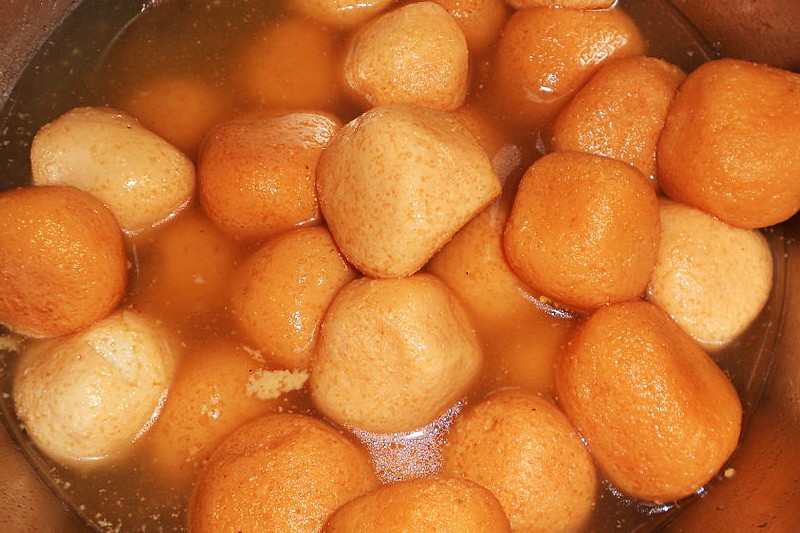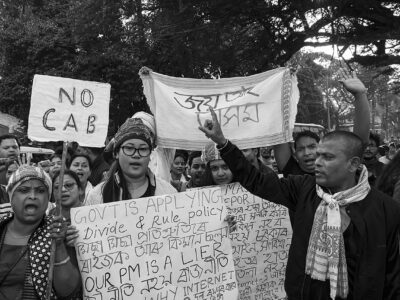
The signature brownish Rasagola from Odisha. Image under CC-by-SA 3.0 by User:Riskyishwar, Wikimedia Commons.
This July 30, Twitter users from the Indian state of Odisha launched a campaign to dedicate an entire day to their state delicacy, a dessert known as Rasagola. (popularly known as “Rasgulla” in India) Calling it “Rasagola Dibasa” (meaning Rasagola Day in Odia-language), Internet users spread the hashtag #RasagolaDibasa, which trended across India for several hours, and celebrated offline in Odisha with support from both the government and private organizations.
Three months back, the Odisha government proposed a “geographical indication” for the dessert, which would establish as a historical fact that Rasagola originated in the area, securing Odisha's “bragging rights” on the dish.
Contrary to some claims that Rasagola is a Bengali dessert, Odisha says it hails from the Jagannatha temple in its region. According to local myth, on July 30, the deities of Jagannatha, Balabhadra, Subhadra, and Sudarshana return to the temple (known as “Niladribije“) after their annual trip to their aunt's house during the grand procession of Ratha Jatra. According to custom, temple-goers present offerings of Rasagola, in order to subdue the gods. This custom is called “Bachanika,” and marks the beginning of Rasagola Day.
Odisha Department of Tourism and Culture welcomed acclaimed sand artist Sudarshan Patnaik to participate at Puri beach:
On #niladribije, The Lord offers #rasagola to Mahalaxmi. @sudarsansand with his masterpiece @Puri. #RasagolaDibasa pic.twitter.com/nvnusnaRgi
— Odisha Tourism (@odisha_tourism) July 30, 2015
A popular radio channel, Radio Choklate, held a Rasagola tasting in the city of Bhubaneswar, where the city's most popular confectioners took part in exhibiting and selling their desserts.
Earlier in the evening at Reliance Foodcourt #RasagolaDibasa pic.twitter.com/MpHydnDwkC
— Ranjan Nayak (@Ranjan_Nayak) July 30, 2015
Popular Odia-language daily The Sambad formally celebrated the day at Pahala by collaborating with a local confectioner, promising and encouraging annual celebrations on the day of “Niladribije.”
Don't forget #RasagolaDibasa tomorrow, even Pahala business is fully supporting, see you tmrw http://t.co/vFICltSsfB pic.twitter.com/9OVXiOiRlJ
— Bhubaneswar Buzz (@BBSRBuzz) July 29, 2015
In Bengal, where there are also popular claims of having invented the dessert, people have reacted with both support for and opposition to Odisha's Rasagola Day.
“This seemed particularly cruel of our next-door neighbours, who are well aware Bengal loves its icons. We are down to just three authentic pieces: The venerable Tagore, the alarmingly-thin haired Sourav Ganguly and the “sickly sweet” rosogolla. Take away the myth of Subhas Bose being alive at 118 but spare our taste buds.”
— Dhrubo Jyoti, blog on Hindustan Times
Revenge is sweet: How Bengalis made rosogolla their own writes @dhrubo127 on #RasagolaDibasa http://t.co/6y2XdXsnYM pic.twitter.com/PSv19EuDYr — Hindustan Times (@htTweets) July 30, 2015
India's national media has also taken notice of the celebration. Outlets including Zee, Hindustan Times, and India Today—not to mention many blogs—have published information and opinion about the event. India's two notable chef-celebrities, Sanjeev Kapoor and Pankaj Bhadouria, have also promoted the day on social media.
Tomorrow (30 July) Odisha is celebrating #RasagolaDibasa Make sure you too have a Rasgulla & also tweet the picture pic.twitter.com/n8oeUGJh0k — Sanjeev Kapoor (@SanjeevKapoor) July 29, 2015
On her Facebook page, chef Pankaj Bhadouria wrote, “Did you know that 30th July is now being celebrated as Rasogola Diwas! Rasogolla is offered as Prasad at Jagannath Temple Puri and especially to Goddess Laxmi a day after the Rath Yatra ! Me? I am happy eating them everyday!! #RasagolaDibasa.”

Chef Pankaj Bhadouria's Facebook post on #RasagolaDibasa.
One of the key campaigners, Anita, blogged about the event, saying:
[..] Niladri Bije is an important day of celebration – the last day of the Rath Yatra marks the entry of the Gods to the Temple after their trip. [..] We are celebrating this day as Rasagola Dibasa- a day dedicated to Rasagolas. In Odia language, Dibasa means day. #RasagolaDibasa means Rasagola Day.
Despite the dispute about the dish's origins, Last week's celebration happily avoided any major mixups between Odisha and Bengal. The nationwide Rasagola phenomenon has also helped promote lesser-known spots in Odisha, like Pahala, which could become important in the region's geographical indication. In the long run, more national and even global attention could bring Odisha's cultural heritage to a much larger audience, helping people inside and beyond the region learn more about its important history.







5 comments
Wonderful! May Odisha get her rightful credit for the Rasagola.
The last sentence in your last para can ensure Odisha’s win.
Thanks for the mention :)
” is this the only piece of heritage that you can show off to the world? Seriously there are better things to latch onto
chaitanna mahaprabhu did come from GEOGRAPHICAL ORISSA but back then there was no orissa, are we forgetting this?
and your dear lord ASHOKA the great wasn’t your hero too until he defeated your so called “kalinga empire”. he was a scavenger of kalinga and not a king
your bali, sumatra etc “J(y)ATRAS” came form LORD ASHOKA’S INVASION of your pillage state.
the regular oriya isn’t sweet at all, its rather very harsh, its rather the languages like sambalpuri and languages near the west bengal border where the oriya dialects turn sweeter. would you not agree?
sambalpuri is such a cute language! why are you guys stomping it down to non-exitence and these guys want their language to prosper just like yours. give them their due!
oh, btw, i forgot to mention YOUR BEST CM (infact my best CM too, one of the best CMs our country ever had) doesn’t even speak Oriya! ”
KAMONASISH AAYUSH MAZUMDAR
MBA, IMT Ghaziabad
Vertical Head,
Mobile Internet Products & Data Services at Airtel
Bengaluru
http://in.linkedin.com/in/7thsense
“just changing the name from roshogolla to rasagulla won’t make it Intellectual property of Oriyas.
Rashogolla, like the most sweets in India will always and forever be a Bengali thing. Remember that Bengali households still are known for their amazing food culture and this fact is known world-wide :)”
KAMONASISH AAYUSH MAZUMDAR
MBA, IMT Ghaziabad
Vertical Head,
Mobile Internet Products & Data Services at Airtel
Bengaluru, Karnataka, India